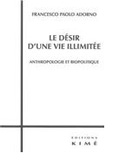It is becoming even clearer that technological progress will soon make us capable of modifying human nature at our own will. The goal of making the dream of eternal youth free of sickness and of death is defeating its last obstacles. The possibility of changing human nature has become more acceptable both by the incapacity to justify the value of man as much as the incapacity to define its specific traits and thus its place in nature. Furthermore, we expect from this biotechnological “prometheism” the definitive liberation from oppression. Human beings will be free to choose their identity and form as they please, they will become completely autonomous and responsible for their form of existence, their bios, and thus for their choices. Post-humanism in all of its declinations is in the process of working out possible scenarios of a world inhabited by mutants, cyborgs, hybrid beings finally capable of controlling all aspects of existence and of living in complete freedom. The goal of this work is to show the ideological presuppositions and the problems with these attempts to combine aesthetics and ethics in order to create a space of absolute freedom. The ideology of human manipulation develops within the political configuration of modernity as biopolitics in the terms defined by Foucault. In this sense, it is argued that argues that post-humanism is, however, the result and the theoretical construction of biopolitics. In this case, a form of resistance may be found in a process of reappropiation of death.
Le désir d´une vie illimitée: anthropologe et biopolitique


